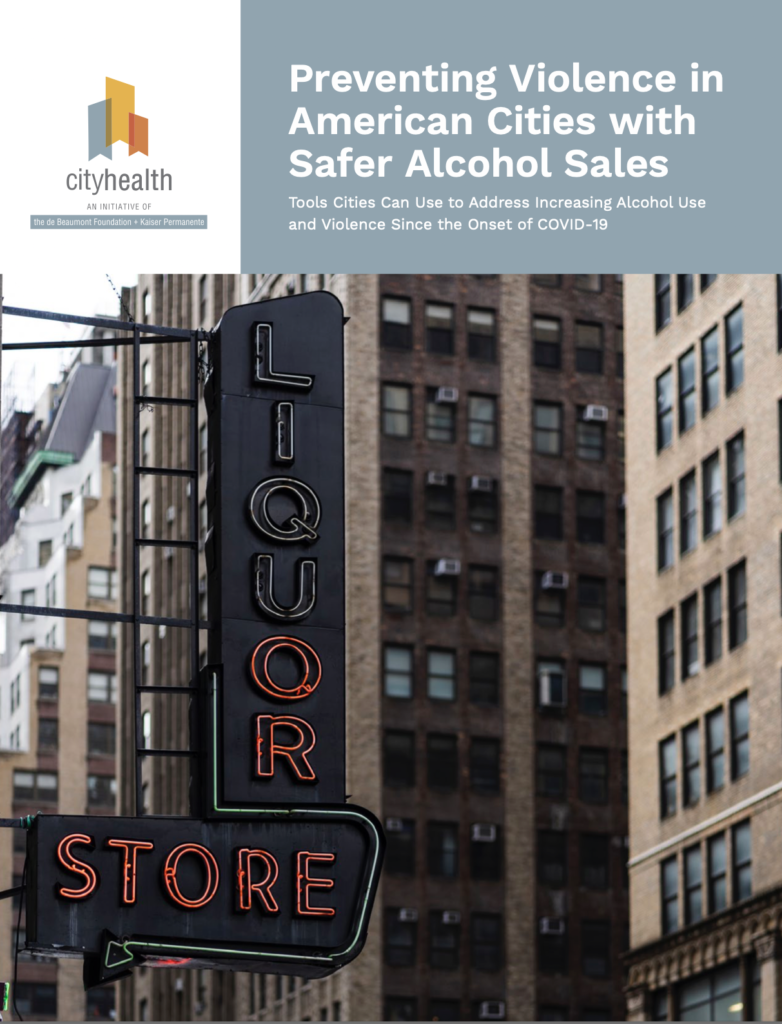Since the COVID-19 pandemic broke out, off-premise alcohol sales have risen sharply across the United States (U.S.). A new report published by CityHealth analyzes the relationship between alcohol outlet density and violent crime. Then it provides safer alcohol sales policy options to help cities reduce violent crime and to improve the health and well-being of citizens.
In the U.S. alcohol harm is pervasive. For example:
- Alcohol is linked to 47% of all homicides.
- Every year approximately 3,500 people under the age of 21 die because of alcohol.
- Harm caused by the products and practices of the alcohol industry cost the U.S. $249 billion in 2010.
According to the new report, multiple studies have found that areas with greater alcohol outlet density have more homicides, aggravated assaults, sexual assaults, and aspects of neighborhood disadvantage.
Cities in the U.S. have the power to regulate alcohol outlets through zoning regulations, licensing, and nuisance laws, which can be powerful tools in limiting alcohol use and reducing violent crime. By adopting policies that regulate where, when, and how alcohol may be sold, city leaders have an opportunity to engage their residents on issues including economic development and neighborhood investment, while also ensuring that health outcomes are shared equitably.
CityHealth, an initiative of the de Beaumont Foundation and Kaiser Permanente, awards the nation’s 40 largest cities with gold, silver, or bronze medals annually in nine policy areas that are proven to help citizens and communities be healthier. One of these policy solutions is safer alcohol sales, which are achieved through local regulations from licensing to zoning. Specifying the number, density, and sales and service practices of alcohol outlets in a given neighborhood is enabling cities to prevent and reduce harm caused by the products and practices of the alcohol industry.
The recommended safer alcohol policy options for cities are:
- Banning particular products or product sizes (e.g., no malt-based beverages larger than 18 ounces, no airline mini bottles, etc.);
- Restricting signage and placement of advertising;
- Limiting overall size as well as floor space devoted to alcoholic beverage sales;
- Limiting hours and days of alcohol sales;
- Requiring distances between alcohol outlets, or between outlets and sensitive uses such as schools, playgrounds, and churches;
- Restricting alcohol specials such as time-limited pricing, all-you-can-drink, and special high-potency beverages containing multiple shots of liquor;
- Mandating responsible beverage service training for all servers and sellers;
- Requiring, for outlets licensed as restaurants, that more sales revenue come from food than alcohol;
- Making permission to operate contingent on absence of a wide range of nuisance activities, including disturbance of the peace, drug activity, public intoxication, alcohol use in public, harassment of passersby, gambling, prostitution, sale of stolen goods, public urination, theft, assaults, batteries, acts of vandalism, excessive littering, loitering, graffiti, illegal parking, excessive loud noises (especially in the late night or early morning hours), traffic violations, curfew violations, lewd conduct, or police detentions and arrests;
- Banning the sale of drug paraphernalia; and
- Levying a nuisance abatement fee on alcohol outlets to pay for enforcement of these provisions.
